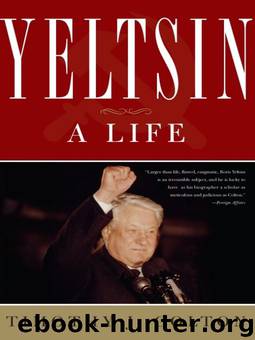Yeltsin by Timothy J. Colton

Author:Timothy J. Colton
Language: eng
Format: epub
Publisher: Basic Books
Published: 2011-09-17T04:00:00+00:00
His medical issues, and his tendency not to look after them, dated back decades. The tonsil infection and rheumatic fever at UPI, when Yeltsin refused the bed rest prescribed, foretold a tendency to slight doctor’s orders, on the assumption that exercise and self-command would see him through. “I take risks with my health,” he said in one of his books, “because I rely heavily on my body’s [strength]. I do not always take special care of myself.” 90 In June 1992 he had his first comprehensive physical examination since 1987. A bulletin signed by a consilium of five doctors pronounced his health good and noted “the staying power of the patient.”91 Yeltsin’s complaints over the next several years were mostly minor, in particular, backache (for which he had an arthroscopic procedure in September 1993), sciatic inflammation of nerves in the legs, and the nasal condition. But his haggard visage and no-shows fueled often scurrilous speculation. The movie director El’dar Ryazanov, who interviewed him in April 1993 and in two sessions in November, found him changed over the seven months. Courtly in April, Yeltsin was perspiring, puffy-eyed, and “programmed” in November and lugged “an enormous burden of guilt” over political developments. Midway through the first November session, he had to interrupt it for a catnap, informing Ryazanov that he was now in the habit of sleeping in the daytime.92 By 1994 Moscow insiders were using the alias Dedushka— Grandpa, or the Old Man—in chitchat about him.
It emerged that the principal problem was cardiovascular illness. Yeltsin is known to have experienced angina pectoris, ascribable to ischemic deterioration of blood flow to the heart, in September–October 1991, January 1992, and September 1994. On the last occasion, on September 30, 1994, he ruffled diplomatic feathers when he was a no-show for a meeting with the Irish prime minister, Albert Reynolds, at an airport layover in Shannon. After Berlin, one month before, the world press ascribed it to drinking, which had indeed triggered the incident. First Deputy Premier Oleg Soskovets greeted Reynolds in Yeltsin’s place. Yeltsin apologized to Reynolds on October 6, saying he had overslept. He was sensitive to those who made fun of his excuse.93 In 1995 his symptoms reached life-threatening dimensions in a rapid-fire sequence of three heart attacks in six months: the first two (on July 10 and October 26) reported in the Russian media, the third (in late December) unreported. 94 He was laid up after each in the TsKB, the government’s premier hospital, in southwest Moscow, spending a total of six weeks there and seven in the sanatorium at Barvikha. At the TsKB in October–November, he for the first time did government business out of a hospital bed for a considerable period. From now on, there would be an ambulance in his motorcade.
Aging, the wear and tear of a lifetime, the high-fat diet common in Russia and the former Soviet Union, and the acute pressures of governing in a decade of troubles made Yeltsin an excellent candidate for the disease.
Download
This site does not store any files on its server. We only index and link to content provided by other sites. Please contact the content providers to delete copyright contents if any and email us, we'll remove relevant links or contents immediately.
Waking Up in Heaven: A True Story of Brokenness, Heaven, and Life Again by McVea Crystal & Tresniowski Alex(37777)
Empire of the Sikhs by Patwant Singh(23066)
We're Going to Need More Wine by Gabrielle Union(19028)
Hans Sturm: A Soldier's Odyssey on the Eastern Front by Gordon Williamson(18561)
Leonardo da Vinci by Walter Isaacson(13302)
The Radium Girls by Kate Moore(12009)
Tools of Titans by Timothy Ferriss(8357)
Educated by Tara Westover(8040)
How to Be a Bawse: A Guide to Conquering Life by Lilly Singh(7464)
Permanent Record by Edward Snowden(5822)
The Last Black Unicorn by Tiffany Haddish(5621)
The Rise and Fall of Senator Joe McCarthy by James Cross Giblin(5264)
Promise Me, Dad by Joe Biden(5138)
The Wind in My Hair by Masih Alinejad(5084)
A Higher Loyalty: Truth, Lies, and Leadership by James Comey(4942)
The Crown by Robert Lacey(4795)
The Iron Duke by The Iron Duke(4343)
Joan of Arc by Mary Gordon(4088)
Stalin by Stephen Kotkin(3949)
